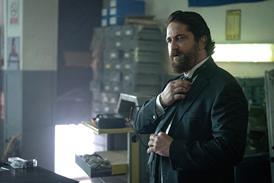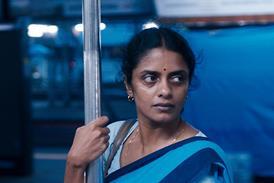Dir: Masahiko Nagasawa. Jap. 2002. 122mins.
In the past, Japanese audiences have flocked to Hollywood Death Row films like Dead Man Walking and The Green Mile - and local producers have taken note. Now Masahiko Nagasawa has directed The Thirteen Steps (13 Kaidan), which tells the story of two men who try to exonerate a Death Row prisoner while wrestling with their own demons. Like its Western models, the film, which opens in Japan on Feb 8, has mass audience ambitions. Abroad, however, The Thirteen Steps will be a harder sell, since none of the usual foreign film labels - art, cult or heart-warming crowd pleaser - quite apply. The topical subject matter, however, is stirring overseas interest: the film plays in the World Cinema sidebar at Sundance, with other festivals probably to follow.
The death penalty has been abolished in almost every developed country save the US - and Japan. Unlike Americans, however, most Japanese regard death row with near indifference. Executions are rare - there were only two in 2001 - and are announced only after the fact, even to the relatives.
Yet The Thirteen Steps still accedes to the melodarma practised by so many Japanese issue films. The big rage, revelation and reconciliation scenes pull out all the emotional stops, as the music swells. Where the film differs from others is in its chilling insistence on realism, examining every step of the execution process, from the death sentence to the fatal drop (hanging is the only method of execution in Japan). It also scotches the local myth that the condemned man must climb 13 steps to the scaffold.
Despite its attempts to minimise trauma for both executed and executors alike, this process is not, as the film shows, as successful in dealing with failures of judgement and changes of heart. The Thirteen Steps wants to be as eloquent a plea for death penalty review as its Hollywood models, but its soon devolves into a murder mystery, with the narrative focus on the two principal investigators.
Mikami Jun'ichi (Takashi Sorimachi) is a paroled prisoner sentenced for manslaughter, while Nanjo Masaji (Yamazaki Tsutomu) is the prison official in charge of Jun-ichi's case. A lawyer for an anonymous client has promised them Yen 10m each if they clear the name of death row prisoner Kihara (Kankuro Kudo).
While a paroled convict, Kihara was found unconscious after a motorbike accident - and a couple serving as his parole officers were found dead in their nearby home. Though Kihara had no memory of the hours preceding the accident, he was found guilty - and Nanjo and Jun-ichi have only three months to exonerate him.
While investigating, Nanjo and Jun'ichi become closer - and confront their own pasts. Jun'ichi apologises to the father of the man he accidentally killed in a fight, but, three years on, the father is still consumed with rage. Discouraged, Jun'ichi is about to resign from the case when Nanjo confesses that, 13 years before, he executed a prisoner (Hiroyuki Miyasako) who had repented of his crime, since when he has wrestled with his conscience.
Yamazaki, a veteran who worked with Akira Kurosawa and Juzo Itami, and Sorimachi, a hot young TV drama star, would seem to be an oil and water combination, but Sorimachi dials down his usual TV histrionics and delivers a solidly grounded, if overly muted, performance. Meanwhile, Yamazaki's natural vitality compensates for Sorimachi's inwardness. Unlike the comically contrasting heroes of many buddy movies, their characters connect through a shared sensibility. Think the guards of The Green Mile - but jumping through more plot hoops, with Sorimachi as the Japanese Tom Hanks.
Prod cos: Fuji TV, Pony Canyon, Imagica, Toho
Japan dist/int'l sales: Toho
Exec prod: Masaki Miyauchi
Prod: Yu Kakutani
Scr: Nao Miyashita
Cinematography: Jun'ichi Fujisawa
Eds: Hidekazu Kakematsu
Music: Nick Wood
Main cast: Takashi Sorimachi, Tsutomu Yamazaki, Tsurube Shofukutei, Rena Tanaka, Kankuro Kudo, Hiroyuki Miyasako



















No comments yet